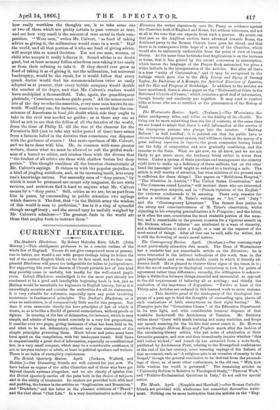The Contemporary Review. April. (Strahan.)—Our contemporary is not particularly attractive
this month. The Dean of Westminster has a readable but not remarkable article on the Eirenicon; he is more interested in the indirect indications of the work, than in the quite improbable and even undesirable result to which it directly ad- dresses itself. He is pleased to observe three signs of the times in it ; first the novel tendency in theological controversy to look for points of agreement rather than difference; secondly, the willingness to acknow- ledge a distinction between things essential and unessential, as opposed to the old requirement of believing all or nothing ; and thirdly, the confession of the impotence of dogmatism. "Twelve at least of the Thirty-nine Articles are reduced in this learned work to mere truisms.
This decisive proof of the inadequacy of the theological lan- guage of a past age to bind the thoughts of succeeding ages, places all such confessions of faith everywhere on their right footing." Mr. Plumptre puts the "Conscience Clause" of the Education Department in its true light, and with considerable humour disposes of that would-be Sacheverell the Archdeacon of Taunton. Mr. Banbury writes about Crete' with much learning and many statistics, and keeps our mouth watering for the tit-bits that never reach it. Dr. Howson reviews Stanley's Hebrew Kings and Prophets much after the fashion of the circulating-library critics, who put notes of admiration at their favourite passages, and now and then tremulously inquire whether "this isn't -rather wicked ;" and somebuly has extracted from a note-book, published by Archdeacon Pratt, relating to the Evangelical conferences at the end of the last century, some amusing sayings of the fathers of that movement, such as "A religious quiz is an occasion of enmity to the Gospel," though the general conclusion to be derived from the proceed- ings of these, as of most other conferences, is the old one, "With how little wisdom the world is governed." The remaining articles on "University Reform in Relation to Theological Study," "Pastoral Work," and "Politico-Eccleaiastical Questions in Italy," do not call for special notice.






























 Previous page
Previous page